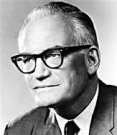Much is being said about what it means to be a true Conservative. In the Republican presidential debates each candidate is jockeying to place themselves as the truest and most consistently conservative of the group. This has bothered me because I’m not sure what they mean by conservatism anymore. Is it the most historically accurate realization of the conservative movement, or is it what the neo-cons have carved out as conservative values over the past few decades? Or is there a newer conservatism that is, in fact, truer?
So I decided to offer some historical insight into the evolution of conservatism over the course of my lifetime in order to, hopefully (but probably futilely), re-calibrate the modern conservative argument.
I’m going to start with Barry Goldwater, because he was the preeminent “conservative” during his career, whose revived conservatism during, and post, Kennedy, tilled the soil for the Reagan Revolution.

Goldwater did not favor blind partisanship and advocated for Nixon to resign at the height of Watergate. From that the term “Goldwater moment” entered the political lexicon and is used today to describe situations when influential members of Congress disagree so strongly with a president from their own party that they rise up and take a stand against him.
He saw the religious right’s views as an encroachment on personal privacy and individual liberties and in 1981, gave a speech on how he was angry about the bullying of American politicians by religious organizations, and would “fight them every step of the way.”
While Goldwater was a staunch anti-Communist, he rejected the fringes of the anti-Communist movement and in 1956 sponsored the passage of the Alaska Mental Health Enabling Act to establish mental health care in Alaska. He faced fierce opposition from the far right who claimed that the Act was a communist plot in order to “brainwash” Americans. Pretty ludicrous and undeniably FRINGE…but, it does sound an awful lot like what a current conservative Alaskan might suggest…
On the subject of gays in the military, Goldwater said, “Everyone knows that gays have served honorably in the military since at least the time of Julius Caesar. You don’t have to be straight to be in the military; you just have to be able to shoot straight.”
His disgust with the direction of the Republican Party in his later years compelled him to say this to the party: “Do not associate my name with anything you do. You are extremists, and you’ve hurt the Republican Party much more than the Democrats have.”
 My favorite Republican of the modern era is Dwight D. Eisenhower.
My favorite Republican of the modern era is Dwight D. Eisenhower.
Having been the Supreme Commander of Allied Forces in Europe during World War II, Eisenhower had a pretty fair grasp on the realities and consequences of war. During his presidency he said, “Every gun that is made, every warship launched, every rocket fired signifies, in the final sense, a theft from those who hunger and are not fed, those who are cold and are not clothed. This world in arms is not spending money alone, it is spending the sweat of its laborers, the genius of its scientists, the hopes of its children. This is not a way of life at all, in any true sense.”
He even offered insight on what would become the Bush/Cheney doctrine: “All of us have heard this term ‘preventative war’ since the earliest days of Hitler. I recall that is about the first time I heard it. In this day and time, I don’t believe there is such a thing; and, frankly, I wouldn’t even listen to anyone seriously that came in and talked about such a thing.”
Can you imagine any Republican saying this today about Union organizing and labor?: “Only a fool would try to deprive working men and working women of their right to join the union of their choice…Workers have a right to organize into unions and to bargain collectively with their employers. . . a strong, free labor movement is an invigorating and necessary part of our industrial society.”
Or “social programs”?: “Should any political party attempt to abolish social security, unemployment insurance, and eliminate labor laws and farm programs, you would not hear of that party again in our political history.”
In 1960 Eisenhower signed into law the Kerr-Mills Bill, generally considered to be the forerunner of Medicare. For the first time, Kerr-Mills provided for government payment of medical bills of 70% of citizens aged 65 and older.
Then, of course, there’s Nixon…

Sullied forever, even within his own party for the shortcomings of his paranoid personality, Nixon was at one time the pinnacle of American conservatism and a landslide winner in 1972. Yet, it was Nixon who created the Environmental Protection Agency, he even proposed healthcare reform that wasn’t much different than “ObamaCare.”
Nixon’s domestic and foreign record stands firmly in the progressive tradition. Federal spending grew faster during Nixon’s tenure on social programs than during Johnson’s (from $55 billion to $132 billion). While Nixon would criticize and attempt to reform welfare, he nonetheless approved massive increases in funding for other Great Society programs such as the Model Cities program and the Department of Housing and Urban Development. Even for cost-of-living increases for Social Security recipients and other entitlement programs.
Federal spending for the arts (even though Nixon hated cultural elites and they hated him) quadrupled.
And finally….the Neo-Con God himself, Ronald Reagan…

Ronald Reagan sincerely desired to abolish all nuclear weapons and he proposed to Gorbachev that if a missile shield could be built, all nuclear weapons be eliminated and the missile shield technology shared, the world would be much better off.
Reagan wrote: The Pentagon said at least 150 million American lives would be lost in a nuclear war with the Soviet Union — even if we ‘won.’ For Americans who survived such a war, I couldn’t imagine what life would be like. The planet would be so poisoned the ‘survivors’ would have no place to live.
Such a comment today would receive from the right, “He’s making us appear weak!”
I suggest that, because that is exactly what they chimed, in unison, when Obama said the VERY SAME THING.
During the Reagan years, the United States borrowed heavily both domestically and abroad, raising the national debt from $700 billion to $3 trillion; percentage-wise, the largest increase in history. But to hear Republicans today talk of the debt and deficit spending, you’d think the concepts were hatched from Sodom and Gomorrah.
Reagan, by the way, continued to fully fund Social Security and Medicare because the elderly were dependent on those programs. Reagan once wrote that he was never trying to undo the New Deal and that, in fact, he admired FDR (he voted for him four times…although Reagan was a Democrat in those days).
The point that I am attempting to make here is that there once was a conservative center that was compatible with progressive values, and it is my observation that the modern Republican Party is being blinded by such a fierce sandstorm from far right-anti-liberal forces that reasonable debate has become folly.
Once upon a time, not so long ago, progressive ideas meant ideas for the betterment of society and conservatives could embrace many of them.
Today, Republicans are fighting each other over “Who is the truest, super conservative?” as if some pure, ideological blood line back to King George will prove that they should be the anointed leaders. But, the fever-pitched, non-conformity that results from this fringe-mania makes rational thinking irrelevant, and cripples cooperative legislation.
To be fair, I should probably look at Progressive ideology over the past 50 years and offer some analysis of how liberal politicians have evolved…my fear is that I will be disheartened to see how far we’ve drifted to the right….